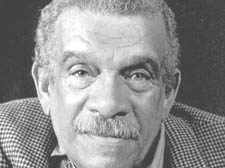|
|
 |
| |

Derek Walcott |
Poet Walcott a ‘terrible loss’ for Oxford
IS the spectre of the poet Ted Hughes – the devil incarnate in the eyes of some feminists – abroad again?
I’m sure I smelled sulphur as I read about the knockout blow dealt to another great West Indian poet, Derek Walcott, who has been denied the poetry chair at Oxford.
Walcott, a Nobel prize winner, was favourite for the post until anonymous letters circulated dredging up a case in the States 30 years ago when he was accused of making advances to a woman student.
Indignation swept through professorial circles in the nation when the award was handed to Ruth Padel – considered to be of inferior quality.
Readers may know that Ted Hughes’s wife, the much anthologised poet Sylvia Plath, gassed herself in Primrose Hill in the 1960s after she discovered her husband was having an affair.
Novelist Caryl Phillips does not conceal his anger over the Walcott affair.
“I think the situation with Walcott is a terrible loss for all the academic community in Oxford, students and faculty alike,” he told me yesterday (Wednesday).
Phillips, who lectures at Oxford, added: “They had the opportunity to have among them one of the great poets of the 20th century in the autumn of his career, and it has been derailed by a cowardly anonymous campaign of personal vilification. It’s very sad.”
I met Phillips at a gathering of writers at the British Library, Euston, on Monday evening. They talked about books that had “made” them – Helen Cross, Diana Evans, Aamer Hussein, Marina Warner.
“It’s the Ted Hughes affair all over again,” a guest told me later at a reception. I gather Walcott feared that if he accepted the post there would be a poster-waving posse of feminists at his first lecture. So he treated the matter with dignity and withdrew from the election.”
The evening was a celebration of 25 years of a very good international magazine for contemporary writing, Wasafiri, based at the Open University office in Camden Town.
Peter’s photos give us food for thought...
AS a purveyor of mung beans, organic carrots and all things healthy, you might think that Peter Haxton’s photographs would follow a similar bent.
In fact, the owner of one of London’s oldest health food shops, Sesame Wholefoods in Primrose Hill, has an eye for more surreal subjects.
Flotsam on the Regent’s Canal, weathered gravestones at Highgate Cemetery, and items washed up on the awkward scrap of sand known as Thames Beach all feature in his first major exhibition, Hold On, at Hampstead’s Burgh House until the end of this month.
“The things that inspire me most are things that are possibly not going to be there tomorrow,” he told me.
Mr Haxton, 56, was a gardener in a crematorium in Amersham until a fellow gardener converted him to the virtues of healthy nutrition. He has run Sesame’s for 26 years – it was established in 1971 – long before “five-a-day” or “organic” became part of everyday parlance.
And his passion for photography predates his wholefoods career; he has been taking photos, predominantly on a traditional film camera, since he was a teenager.
•
This really isn’t a proper way to remember Charlie`
HE was given the Freeman of the Borough.
I never met him, but judging by the stories of people who knew him he was a working class hero. The names of such people should live on. Far too often they are forgotten.
Well, his name, Charlie Ratchford, has lived on over the decades in what can be described as the personification of his philosophy – a meeting place for the elderly in Chalk Farm, known as the Charlie Ratchford Centre.
Now, it’s rumoured soul-less officials at the Town Hall have decided to bury the name of this man when they demolish the building.
Surely, this man should not be shown the door of history.
A Queen’s Crescent boy who left school at 14, Ratchford worked as a plate layer for British Rail until ill health forced him behind a desk in his mid-thirties.
He entered local politics in 1940 as the councillor for Grafton ward and served on the council for the next 30 years.
Charlie, who was leader of the council, was awarded a CBE in 1968 for his achievements and work in local government. He died of pneumonia in 1972, aged 69.
The late Millie Miller, council leader in the 70s, said Ratchford was responsible for suggesting the name of Camden when the boroughs of Hampstead, St Pancras and Holborn merged. Cllr Miller described him as “probably the most outstanding and dedicated person in the history of St Pancras. He was an outstanding example of a working-class man who devoted himself to helping others.”
Martin Morton, once a Tory leader of the council, once said: “There was not a street he did not know well and not a person he did not know well.”
MP Chris is caught with his pants down
CHRIS Bryant, deputy leader of the Commons, has risen high since his days as agent for the St Pancras Labour party in the 90s.
By the time I had met him at the party’s HQ in Camden Town he had abandoned his cassock as a clergyman.
Later, he wrote an unauthorised biography of Glenda Jackson which incensed her, and was then parachuted by the Blair machine into one of the safest Labour seats in Britain – in the Rhondda.
He was singled out in Saturday’s Daily Telegraph roll of shame as an MP who had flipped his second home twice, allowing him to claim for renovations.
A little more pedestrian than the time five years ago when he posted a photograph of himself in his underpants on a gay dating website. |
 |
|
|
 |
|
 |
|